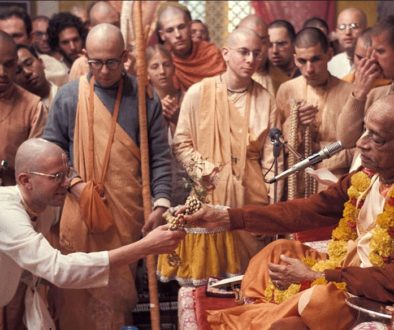Illuminations 73 – Husband As Guru
Recently an unmarried female devotee told me that a man was interested in getting to know her, and in their discussions he mentioned that ‘the husband is the guru.’ She asked me for guidance on the subject.
This Illumination is what I wrote to clarify for her (and him) what it means for a husband to be a guru – and what it doesn’t mean; for misunderstanding what this means will be the cause of an unhappy marriage.
Even though Prabhupada writes that a failed marriage is usually the woman’s fault, if a woman has a good husband, she will stay loyal. As I often tell men, “Don’t make it difficult for your spouse to be a good wife.”
I had some reservations about making this letter public because I expect that some men will not agree with me (although I doubt any woman will disagree). But I decided to turn it into a newsletter because it is an important discussion.
I would be happy to hear your comments on this important subject.
May you always think of Krishna,
Mahatma das
Is it the Woman’s Fault?
Even though Prabhupada writes that a failed marriage is usually the woman’s fault, if a woman has a good husband, she will stay loyal. As I often tell men, “Don’t make it difficult for your spouse to be a good wife.”
The husband as the guru of the wife is an interesting topic. Some men operate under the paradigm that since I am the guru of my wife, she is duty-bound to do anything I ask of her. I am not saying it is not the duty of the wife to submissively serve the husband, but the idea that a husband has a right to be over-demanding of his wife reflects a misunderstanding of the duty of the husband.
You might think, “Are there really many men today in ISKCON who are that demanding?” Not only are there demanding men in ISKCON, some (perhaps many) are more demanding of their wives than men outside of ISKCON. My experience shows me that many men have misunderstood Prabhupada’s statements about the duty of a husband and the duty of a wife.
We have a higher divorce rate in ISKCON than in the outside society. We also have a high rate of unhappy marriages (devotees who remain married because they are dutiful, not because they are happily married). This problem is commonly caused by male devotees misunderstanding what it means to be a man.
Arrogance
In sastra we read that the husband is the guru. Many men believe this means the wife should obediently do whatever is asked of her, no matter how difficult or unreasonable it may be. But the husband does not have the right to be unreasonably demanding. This is not the kind of relationship a guru and disciple have.
When Prabhupada was asked by his disciple Vishal, “Should the wife do whatever the husband says?” Prabhupada replied, “And you should be so arrogant?”
What does it mean to be guru to a wife and what does it mean for the wife to see her husband as guru? Guru is one who is moving towards Krsna. If the husband is moving towards Krsna, naturally the wife will follow. And even if she doesn’t follow him perfectly, by serving him she partakes in his spiritual advancement. So husbands, your main duty as guru of your wives is to be steadily advancing in Krsna consciousness.
A Guru Shows Affection
A guru does not push the disciple beyond his or her limits. Neither should a husband. A guru encourages his disciple according to his propensity so that he is enlivened and happy. Women married to overly demanding men are rarely happy. This is because a woman wants a husband who is affectionate, not dictatorial.
Of course, a guru guides the disciple. But to guide the wife, and for the wife to want to listen to the husband, she must be well taken care of emotionally, not just taken care of materially. Disciples follow their guru because of the love and care they receive from him. The guru is full of affection for his disciple, always giving to the disciple more than the disciple is giving back. Thus the disciple wants to reciprocate. It must be the same with a husband.
Walk Your Talk
The husband/wife relationship is not meant to mimic a formal guru/disciple relationship, because the guru/disciple relationship is predominated by awe and reverence, whereas a husband/wife relationship is predominated by friendship and conjugal affection. So ‘husband as guru’ refers primarily to the man being spiritually strong, setting a good example, showing affection and inspiring his wife in spiritual life by his example.
Being guru means to “walk your talk.” If a man does this, naturally the woman will respect him. If he wants respect, he must act in a way that commands respect. If he doesn’t act respectfully, but only demands respect, he should not be surprised – or upset – when he doesn’t receive the respect he demands.
Listen to Me
If the husband is guru, doesn’t it mean it is his duty to instruct his wife? In Vedic times women did not receive diksa, so because the husband was trained in the gurukula he would take responsibility to give his wife the knowledge he received from his guru. Today, women have access to instructions from many gurus and teachers, so the role of the husband as sole spiritual teacher has changed.
Women appreciate husbands who follow Krsna consciousness well, but as mentioned above, it is unlikely that he is the one she receives most of her spiritual instructions from. This is because the husband/wife relationship is not primarily a teacher/student relationship; it is a partnership. Still, if a couple has a good relationship, and the husband is a good devotee, the wife will appreciate a husband who shares Krsna consciousness with her.
And men, beware that sometimes in the name of doing your duty to instruct your wife, you latch into a fault-finding session. And then you scratch your head, wondering why your wife is reluctant to listen to you in the future? When instructing your wife, especially in sensitive areas, do it with care, affection and sensitivity. If in the name of instructing your wife she becomes upset, unhappy or discouraged, you are failing in your duty as a husband/guru.
You Are Always a Servant
Men, remember you are a servant, not a master. It is sometimes a challenge to remember this in household life, but it is written on just about every page of Srila Prabhupada’s books; and I haven’t read any disclaimer stating that being a servant doesn’t apply to your wife.
Did I hear someone say, “If I do this I will be controlled by my wife. Then I am not a man.”?
Be a real man
Being masculine doesn’t mean to control the wife so as to ensure that one is not controlled by her. To be masculine is to make a wife happy, to fulfill her needs, and be sensitive to her ups and downs. If a man does not do this, then he is not being a real man. This means he is being controlled by the lower modes of nature and that he is being more feminine than masculine.
When sastra speaks of being controlled by women, it is not what most men think. To patiently take care of a woman’s needs, to listen to her when she is upset, to be a stable force for her when she is overly emotional, is what it means to be a man. If a man does this, he is sense controlled. If he can’t do this, he is being controlled by a woman’s behavior. This is what it really means to be controlled by a woman.
Unfortunately, many men are not good at being tolerant with their wives, and react to difficult situations by telling their wives they are emotional and they should just pull themselves together. Sometimes when the wife is upset they will argue or fight with her rather than try to understand and help her. Despite what some men think, fighting with a woman has nothing to do with being a strong man. It is the sign of a man who succumbs to the mode of passion and ignorance. Somehow, this fact is so clear to women yet so unclear to men.
Krsna is the supreme male, the supreme masculine, and He is submissive to Radharani. Krsna is never rough and tough with Radharani. He doesn’t yell at her or try to control her. He just tries to make her happy. This is what it means to be male. Of course, the movies portray males as being rough and tough, beating up other big rough and tough guys. But factually those “macho” men are only impressing other men, not other women. Women don’t like these “tough” guys. They like men who are sensitive to their needs.
Men who don’t want to (or can’t) regularly serve the needs of a woman as described above should not marry. If they already are married, they should understand that it is their duty to always show affection and kindness to their wives. Men who can’t take care of their wives well and make them happy are not fulfilling the duties of their asrama.
Purusa Bhava
When the man misunderstands his role as husband/guru, it is probably because his purusa nature is overtaking him (the enjoyer and controller consciousness). This is the potential danger of household life. The association of women tends to excite this enjoying and controlling nature. But bhakti is about serving. So a man shouldn’t think serving his wife means he is being controlled by her; he should think this is his natural position. His predominant role as protector and provider are both servant roles. And what is most important is that the service should be done with affection, sensitivity and understanding.
When there is affection and protection, then a wife will naturally subordinate herself. When there is force and demand, she doesn’t respond well. Yet, even if it works externally because the wife is dutiful, she won’t be happy. If a woman is not happy in her marriage, it usually means the man is doing something wrong. Where there is a happy woman, it generally means she has a good husband.
 If a man thinks, “I am the guru of the family so my wife should simply obey me,” it means he wants the master-servant relationship to predominate in his marriage. But since the conjugal and sakhya moods predominate in marriage, the obedience he seeks will come naturally as a by-product of a good relationship, just as the disciple naturally wants to serve the guru in reciprocation of the guru’s affection. If a husband feels he has the right to force his wife to do things which cause her to be unhappy or put her in difficulty, he doesn’t understand his duty. To such husbands, we must ask the question, “Would you be okay with your daughter marrying a man just like you?”
If a man thinks, “I am the guru of the family so my wife should simply obey me,” it means he wants the master-servant relationship to predominate in his marriage. But since the conjugal and sakhya moods predominate in marriage, the obedience he seeks will come naturally as a by-product of a good relationship, just as the disciple naturally wants to serve the guru in reciprocation of the guru’s affection. If a husband feels he has the right to force his wife to do things which cause her to be unhappy or put her in difficulty, he doesn’t understand his duty. To such husbands, we must ask the question, “Would you be okay with your daughter marrying a man just like you?”
Earn Your Wife’s Affection
It seems that some men care more about being obediently served than having a good relationship. They want their wives to be more like a mother than a wife, to take care of them just because they are the husband. Your mother will happily take care of you even if you don’t do anything for her, but wives are not mothers. Wives will not happily take care of husbands who don’t take good care of them. Men should not think that they automatically deserve the affection and service of their wives. They need to earn it by providing not only physical protection, but by providing emotional support.
Make Your Wife Happy
A wife who serves no matter how a man treats her is a special woman. But because she is special a man may not treat her well because he knows she will obediently serve no matter what. This is a common example of a marriage that continues because of the dutiful wife despite a negligent husband. But the marriage is actually a failure in terms of relationship. If a man does not make his wife happy, he is setting a bad example of what it means to be a husband – and he is failing in his asrama.
If a man tells a woman that the husband is the guru of the wife, she should ask him what he means by this. It is important that the man clearly understands what his role as guru is. If he misunderstands this, he will likely create an unhappy family life. Anyone who gets married for any other reason than to serve will both be let down and frustrate their spouse.
If a man acts like a real guru, his wife will naturally respect and serve him. If he demands respect without commanding it, it will not produce happy results.


